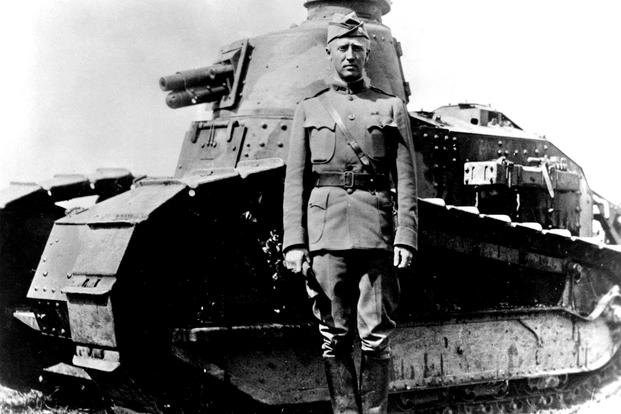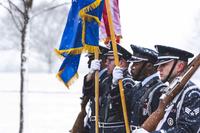Not everybody was happy that World War I ended on Nov. 11, 1918, possibly least of all an Army colonel named George S. Patton.
Patton, then 32, wrote a poem titled "Peace -- Nov. 11, 1918" in which he expressed contempt for civilians cheering the silencing of the guns that would deprive him and other warriors of "the whitehot joy of taking human life."
The date became the U.S. national holiday of "Armistice Day" until 1954, when it was renamed Veterans Day.
Patton's poem is included in the Library of Congress' exhibit, "Echoes of the Great War: American Experiences of World War I," to mark the centennial of the war's end.
The explanatory notes accompanying the poem state, "The day the armistice commenced, George Patton penned a poem encapsulating his feelings."
"The poem described Patton's 'dismay' at the popular excitement that greeted the peace, which he characterized as the 'cruel glee of the weak,'" the notes continue. "Patton's poem mourned the loss during peacetime of the virtues that he believed war inspired, such as sacrifice and purpose."
Patton was dyslexic, as was his commander-in-chief, President Woodrow Wilson, and the draft of the poem presented in the exhibit is riddled with misspellings. The poem begins:
"I stood in the flag decked cheering crowd
Waere [sic] all but I were gay
And gazing on their extecy [sic]
My heart shrank in dismay."
He mocked the "little lives" of those who had not experienced the shared virtues of battle: "The disregard of pain, the glorious deeds of sacrifice, waich [sic] follows in wars [sic] train."
The library's notes say "an editor, possibly Patton's wife Beatrice, has crossed out those lines that express especially strong sentiments like comparing peaceful life to 'a festering sewer' " in the draft of the poem on exhibit.
The reference is to the following lines:
"Looking forward I could see
Life like a festering sewer
Full of the fecal Pacafists [sic]
Which peace makes us endure"
It was during World War I that the legend of Patton as a hard-driving, and controversial, tactical genius took shape. He began the war as an aide to Gen. John J. Pershing, commander of the American Expeditionary Force, and then was essentially assigned to integrate tanks into the U.S. battle plan as head of the AEF's Light Tank School.
As head of the U.S. 1st Provisional Tank Brigade, he commanded Renault FT tanks in the Battle of Saint-Mihiel and was wounded by machine-gun fire in the Meuse-Argonne offensive. He was awarded the Distinguished Service Cross.
During World War II, he commanded the U.S. Seventh Army in North Africa and the U.S. Third Army in Europe, where he earned the nickname "Old Blood and Guts."
-- Richard Sisk can be reached at richard.sisk@military.com.
Stay on Top of Your Veteran Benefits
Military benefits are always changing. Keep up with everything from pay to health care by subscribing to Military.com, and get access to up-to-date pay charts and more with all latest benefits delivered straight to your inbox.
















